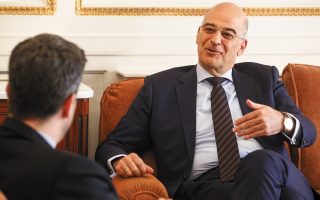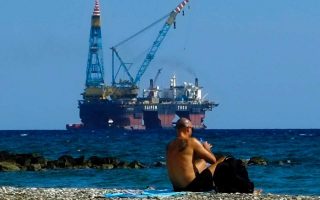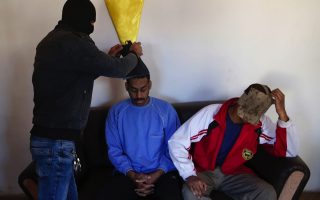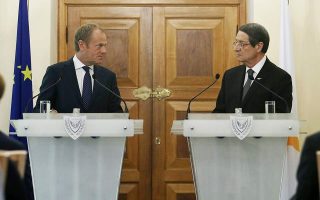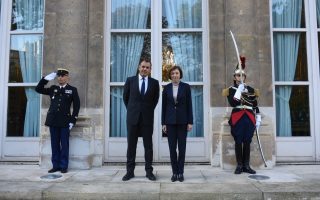NATO expects members to respect international law, Stoltenberg tells Kathimerini
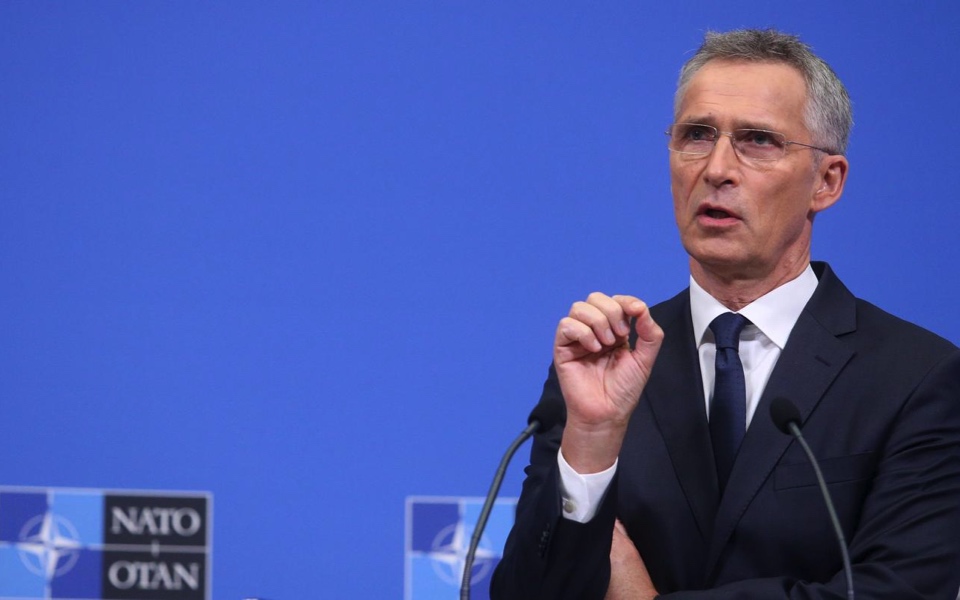
NATO expects all of its member-states to respect international laws, but it is not within its purview to make legal judgments, the alliance’s general-secretary, Jens Stoltenberg, tells Kathimerini, commenting on Turkish activity in Cyprus’ exclusive economic zone (EEZ).
Stoltenberg says that NATO will continue to have a presence in the Aegean Sea helping to control migrant flows, while also adding that all NATO allies had been informed of Turkey’s operation in northern Syria before it was launched last Wednesday.
Turkey invaded Syria a few days ago. Does this intensify concerns about regional security and the possibility of a fresh spike in refugees?
I must stress the importance of restraint so that we avoid even more human suffering, because no one wants to see refugee flows increase again. This is why NATO has expressed its support so strongly for a political solution for Syria under the auspices of the United Nations. We welcome the progress that has been made, but there is still a long way to go before we reach a sustainable and lasting political solution to the challenges and conflicts in Syria more generally, but in northern Syria more specifically. NATO is also helping in the management of the immigration and refugee crisis. Of course, NATO is not the only answer to these challenges but it is a part of it. What we do is try address the root cause of the challenges, helping countries like Afghanistan, for example. A lot of the people reaching Aegean shores come from Afghanistan, as you know. By having a presence in Afghanistan and also in Iraq, we contribute to stability but also to containing immigration. We also need to remember that Turkey is hosting more than 3 million Syrian refugees. That’s more than any other NATO ally. It is, therefore, a challenge that we all need to deal with and do our best for.
Were you prepared for the Turkish invasion in Syria?
Turkey’s intentions were very public. President [Recep Tayyip] Erdogan had made his intentions clear at the podium of the United Nations and even showed a map of this safety zone they want to create. It is something they had been working on for quite some time. They initially tried to do it with the United States. We welcome the fact that the US and Turkey worked together with patrols and operations. But they were not able to maintain this cooperation and now we are seeing Turkey carry out operations in northern Syria without American support. Turkey also informed all of the member-states of the alliance, shortly before launching its operation. It had also been discussed earlier in the framework of NATO.
Would you say that the difference of opinion between the US and Turkey, two of NATO’s most powerful military forces, and, at the same time, Ankara’s very close relationship with Moscow – as evidenced by the purchase of the S-400 missile defense system – affects the alliance’s efficiency?
It is obvious that there are differences of opinion between the allies with regard to the situation in northern Syria. As secretary-general of NATO, I always prefer the allies to have a common approach to challenges like northern Syria, for example. However, we have not been able to agree this time. NATO is not present in northern Syria but some allies are, especially the US and Turkey. NATO is part of an international coalition against ISIS and it is important to remember that efforts need to continue in dealing with this common enemy. They have lost the areas they controlled, but they are still there, in Iraq and Syria, and they are also trying to expand into other countries, including Afghanistan.
Standing NATO Maritime Group 2 (SNMG2) is patrolling in the Aegean Sea to monitor refugee flows. Will the patrols continue?
Greece is on the front line of the refugee crisis. You have received many refugees and illegal migrants who crossed the Aegean, particularly in 2015. Thus I welcome the agreement between Turkey and the EU. NATO’s presence in the Aegean, with six vessels at the moment, concerns the implementation of the deal between Turkey and the EU. The problems have not been solved. However, we have made significant progress compared to 2015. I believe that the importance of NATO’s presence in the Aegean is, effectively, the creation of a platform that allows Greece and Turkey, but also Turkey and the EU, to come together, so as to work closer together to deal with this common challenge. Also, they share intelligence with the Turkish Coast Guard, the Hellenic Coast Guard and Frontex, and it is often the case that NATO ships are the first that spot migrant boats trying to cross the Aegean. NATO, however, does not have a mandate to stop the boats. Our mandate is to bring Greece, Turkey and the EU closer together.
I assume you will discuss developments in Cyprus’ EEZ during your visit to Turkey tomorrow (Note to readers: The interview was held on October 10).
I am always careful and do not make assumptions about the content of my talks. However, I do know that the Cyprus issue is a sensitive one and that there are disagreements. Of course, NATO always expects all states to respect international law. At the same time, NATO cannot make legal judgments. This is up to other institutions.
August marked the demise of the Intermediate-Range Nuclear Forces (INF) Treaty. This adds yet another problem to NATO’s relationship with Russia. Can you see a new solution on nuclear weapons?
The INF Treaty was extremely important to European security. It banned a huge category of weapons. Now Russia has gone back to deploy these military systems. They are mobile, they are hard to detect and they can carry nuclear heads. We regret that Russia violated the INF Treaty. We are not mirroring Russia. We will not deploy nuclear missiles in Europe. We will continue efforts on arms control so that we can all be safer. For this reason we want to reach new settlements on nuclear weapons.
North Macedonia will soon be a full NATO member. Do you think that it can set a precedent for other countries in the Western Balkans that lie outside the alliance?
NATO is open to any country that wishes to join and which fulfills the criteria which we set. Montenegro joined NATO recently, North Macedonia is very close to joining and we are working with Bosnia-Herzegovina. NATO also respects any decision by states that do not wish to become members. For example, we respect Serbia’s statement that it does not wish to join NATO. They want to pursue a policy of military neutrality and this is why they do not wish to join NATO. We have exceptional partnerships with countries that are not NATO members, such as Sweden, Finland and Austria, and we can also have good relations with Serbia.
